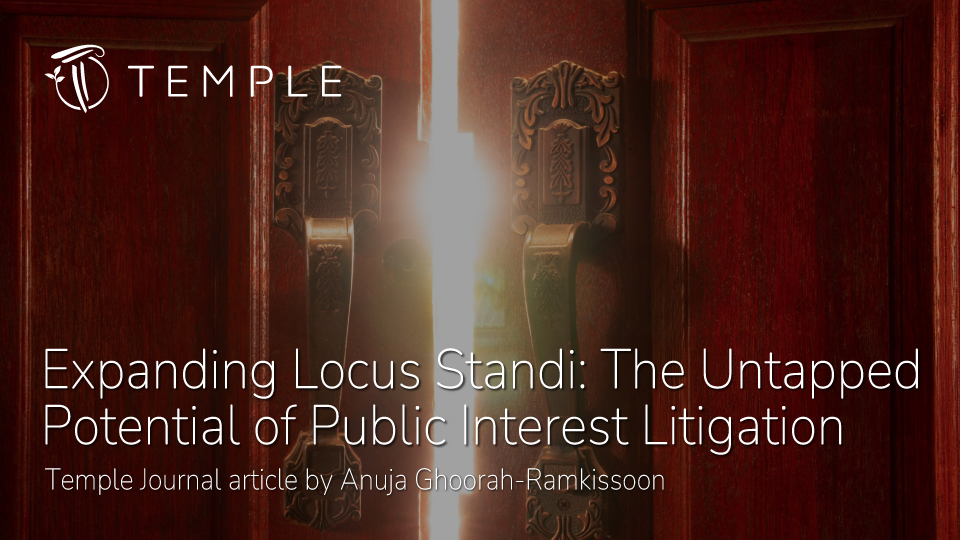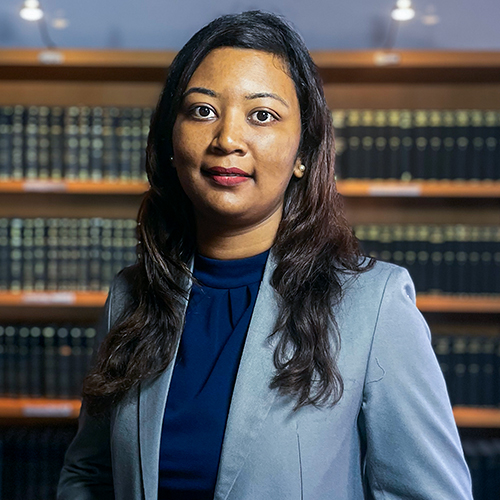Public Interest Litigation (“PIL”) is a fundamental aspect of various legal systems across the globe. PIL can be filed any person acting bona fide and who has enough interest in instituting an action for redressal of public injury or public wrongdoing.[1] In Mauritius, PIL is a concept repeatedly stated by our courts to be “alien to our jurisdiction”, which have constantly insisted that a litigant must have a direct or relevant personal interest in a matter.[2]
There are several case laws in Mauritius where it was determined that the plaintiff had no locus standi in initiating the action. In the case of Tengur v The Ministry of Education and Scientific Research[3], the plaintiff, in his capacity as taxpayer, was held not to have the requisite locus standi to challenge the authorisation given by the Roman Catholic Education Authority to reserve fifty per-cent (50)% of its intake for students of a particular faith on the ground that the said authorisation contravened section16 of the Constitution (protection against discrimination).
Similarly, in the case of IUS Ad Vitam Association v The State of Mauritius & Ors[4], the plaintiff was an association with certain objects (“Association”) , claiming that there had been constitutional infringement in relation to the enactment of section 235A of the Criminal Code which came into operation on 15 October 2012 and which authorises the termination of pregnancy in the specific circumstances subject to the conditions laid down in the section. It was held that the Association had failed to establish that it had itself any personal right that was affected or likely to be affected by the enactment of section 235A of the Criminal Code, since the right to life of an unborn child belonged to that unborn child and not to the Association.
A different approach to PIL is taken in India; the original purpose of which was to make justice accessible to the poor. Numerous cases in India are based on PIL. For instance, in the case of MC Mehta v Union of India[5], MC Mehta demanded that Shriram Industries, located in a congested place in Delhi, needed to close as the industry leaked petroleum gas. The court observed that these hazardous industries contributed to people’s economic development and advancement. Thus, the final decision taken by the judges was to relocate such factories to less populated areas so that they would not pose a threat to human life.
In Australia, the court established the principle that a litigant must have a special interest in the subject matter of the proceedings or be specially affected to be granted standing. In effect, this test puts forward that each case will be decided on its own facts as to who can bring a case. There is also a statutory provision in the Administrative Decisions (Judicial Review) Act 1977 (“ADJRA”) which defines ‘standing’ as including a person whose interests are or would be adversely affected by the decision or conduct sought to be reviewed.
A perusal of Australian cases reveals that the Australian courts seem to be more inclined to grant environmental organisations standing either on the basis of the special interest test under the common law or the aggrieved person test under the statute, provided that such groups satisfy the conditions mentioned in the statute. The courts are gradually moving towards a more expansive and liberal approach to the concept of ‘standing’ especially with regard to public interest groups in the field of environment and climate justice.[6]
A liberal approach to PIL was illustrated in Mauritius in the case of AHRIM v Ministry of Social Security, National Solidarity and Environment and Sustainable Development & Anor[7]. AHRIM is an association of hotels in Mauritius in the said matter and Sea Users Association (“SUA”) presented itself as an association of pleasure craft operators, divers and other sea users. They had entered the appeal in the name of the members which they represent before the Environment and Land Use Appeal Tribunal (“Tribunal”). While the Co-Respondent No. 1 in the case had submitted that there is no PIL in Mauritius hence AHRIM and SUA did not have locus standi, the Tribunal held the view that the associative standing of both AHRIM and SUA is in line with the liberal approach to locus standi taken in the English case law of R v HM Inspectorate of Pollution, exp Greenpeace[8], where Greenpeace could be said to be the representative of the persons having direct interest in the matter. The Tribunal referred to a quote from Wade’s administrative law: ‘The law will now focus on public policy rather than private interest’[9].
We therefore find that a liberal approach was taken in this case where environmental law was involved and it was recognised that environmental stewardship rests on the shoulders of every person in Mauritius. The case of AHRIM (supra) demonstrated Mauritius’s ability to acknowledge a more inclusive approach to standing, particularly where the matter at hand concerns the environment, a societal issue that impacts the whole population. Notwithstanding the existing legal system, the case raises the possibility that PIL could develop into a mechanism for guaranteeing that environmental regulations are upheld and more successfully implemented throughout the nation.
Like many small island developing states, Mauritius is susceptible to the negative consequences of climate change, such as the deterioration of its marine ecosystems, extreme weather events, and rising sea levels. Additionally, local residents rely on these ecosystems for their livelihoods, particularly those in coastal areas. PIL might offer a much-needed channel for promoting the implementation of environmental laws and making both public and private organizations responsible for environmental damage.
Furthermore, PIL has the potential to be an effective social justice tool. Although Mauritius’s locus standi criteria have historically prevented those with merely generalized concerns from accessing the courts, it is impossible to overlook the necessity of addressing significant social issues like poverty, inequality, and discrimination. PIL has been effectively utilised to address these issues in other jurisdictions, particularly when statutory or constitutional rights are involved. PIL could be used, for example, to fight against discriminatory laws, support the rights of underrepresented groups, and pursue justice for people whose voices might not otherwise be heard.
Systemic obstacles frequently keep marginalised groups from obtaining legal redress. Enabling advocates and public interest groups to speak on behalf of these groups could guarantee the protection of their rights and promote greater inclusivity in the legal system. PIL may also be a useful instrument for contesting government policies that disproportionately hurt underprivileged communities, especially in areas like housing, healthcare, and education.
In conclusion, the potential of PIL in Mauritius as a tool for environmental and social justice remains largely untapped. While there is growing recognition of the need for more inclusive legal frameworks, it raises the question: can PIL evolve into a mechanism that truly empowers citizens, advocates, and communities to hold entities accountable, without opening the floodgates to frivolous claims?
[This article is republished from the Temple Journal Second Edition.]
[1] Public interest litigation and child labour: an analysis of the MC Mehta case by Raghav Pandey
[2] Appa Jala v The Honourable Chief Justice & Others [2023] SCJ 132
[3] Tengur v Ministry of Education & Anor [2002] MR 166
[4] IUS Ad Vitam Association v The State of Mauritius & Ors [2014] SCJ 142
[5] MC Mehta v Union of India [1987] 1 SCR 819
[6] Eco-Sud v The Minister of Environment, Solid Waste Management and Climate Change [2023] SCJ 284
[7] AHRIM v Ministry of Social Security, National Solidarity and Environment and Sustainable Development & Anor ELAT 1502/17
[8] R v HM Inspectorate of Pollution, exp Greenpeace 1994 4 All ER 329
[9] Betsy v Bank of Mauritius [1992 MR 231]


